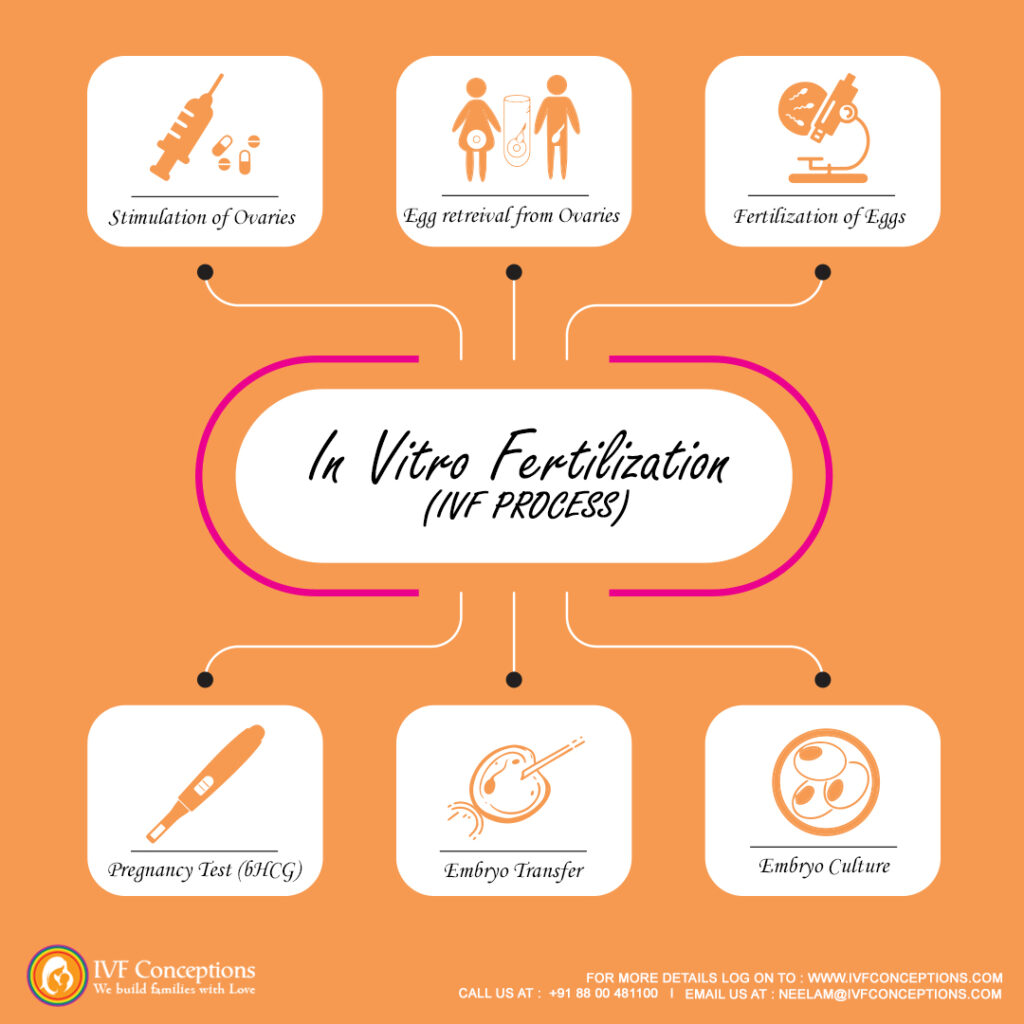9 Factors To Improve IVF Pregnancy Rate in 2025

Maximizing Success: Key Factors to Improve IVF Pregnancy Rate
IVF, or in vitro fertilization, remains one of the most well-known and effective forms of Assisted Reproductive Technology (ART). This advanced fertility treatment involves a combination of medications and specialized procedures to facilitate egg fertilization and ensure successful embryo implantation in the uterus. As we step into 2025, advancements in reproductive medicine continue to enhance success rates. In this comprehensive guide, we explore the latest scientific breakthroughs, lifestyle changes, and medical strategies to help improve IVF pregnancy rates and maximize your chances of conception.
- Book an online appointment: Get a free online consultation.
- Call\W:+91-8800481100 Email:neelam@ivfconceptions.com
In vitro fertilization (IVF) is a widely recognized form of Assisted Reproductive Technology (ART) designed to assist couples in achieving pregnancy. The journey through IVF involves surgical procedures and medications to facilitate fertilization and the implantation of fertilized eggs in the female partner’s uterus.
Additional Resources to Read
How much does Surrogacy Cost
Surrogacy Guide for Surrogate Mothers
Surrogacy Guide for Intended Parents
How does the surrogacy process work
Success in IVF is influenced by a myriad of factors, each playing a vital role in determining the outcome
The IVF process is not an easy procedure. It requires physical, financial, and emotional stress on the part of the parents. So, it is important to have head-to-toe information regarding the IVF procedure. Also, IVF is an expensive treatment. So, most of the infertile women would want the procedure to be successful in the very first attempt.
While pregnancy is all about nature’s will, IVF still has a certain number of factors that ensure couples have a successful attempt at IVF in early procedures.

Factors To Improve IVF Pregnancy Rate-
Here is the list of top factors to improve the IVF pregnancy rate-
1. Age Matters –
Age is an important factor in determining the success rate of the treatment of IVF. Women at a younger age have more chances of successful IVF attempts than women at older age. This is because of the reason that using your eggs is an important part of determining the IVF procedure.
The women at a younger age have a good quality of eggs as compared to women at old age who have poor qualities of eggs. Research has also shown that women before their mid-30s have a 40% chance of having healthy babies as compared to women at the age of 42 who have a 4% chance of the healthy babies.
2. Type of fertility problem you are suffering from –
While some complications with male infertility affect IVF success, factors such as uterine anomalies, DES toxicity, or fibroid tumors often decrease the likelihood of IVF success. Ovarian dysfunction, such as high FSH levels suggesting a low ovarian reserve, may decrease the chances of success with IVF.
Factors that may lower pregnancy rates and lower IVF Pregnancy risk performance include the need for large amounts of drugs to stimulate ovulation. It is important to consider factors such as the length of time you are infertile when both spouses are infertile with lower chances of IVF success. The chances of IVF decrease with the increase in the amount of time the couple remains infertile.
3. The lifestyle you practice –
If you want to have a successful IVF attempts then stop drinking and smoking right away. For women, they need to stop these practices 4 to 5 months before getting the IVF treatment. This is because women who smoke a lot need a higher amount of medication to stimulate their ovaries.
Also, implantation rates are much higher in women who don’t drink or smoke as compared to those who do. Women who are fat or obese also have the chance of infertility or miscarriage. Women who drink a lot may have to undergo more than one fertility cycle.
They also have higher chances of failure and miscarriages. To have a healthy chance of pregnancy you must have the required weight range. Being underweight also reduces your chances of being pregnant with IVF.
4. Previous history of pregnancy –
Further, IVF success factors to consider include whether or not you were pregnant before and whether or not you were pregnant with the same partner. If you were pregnant with the same person that is currently being treated with IVF, there is a higher likelihood of success with IVF.
Factors such as a history of recurrent miscarriages or another spouse can reduce the chances of success of IVF.

5. Use of donor eggs –
Women who are in their advanced age may be required to use donor eggs. This is because as women age, the ovarian reserve starts depleting. Also, the remaining eggs are of very poor quality.
So, if you choose to use donor eggs in case of advanced age then there are high chances of IVF success as compared to when you use self-eggs. The ovarian stimulation is more successful at a young age needing a lesser dose of meds. Oocytes and embryo quality are considered to be good for young women. Read more about, how to choose an egg donor.
6. Choice of fertility clinic –
Your IVF performance can be greatly affected by the IVF Clinic or infertility clinic you choose to administer the procedure. Factors to consider when evaluating the success rate of fertility clinics are as below:
- IVF clinic and staff training and experience.
- The live birth rate per IVF cycle initiated.
- The number of patients pregnant with multiples.
- The laboratory used by the clinic and their staff qualifications.
- The types of patients admitted to the clinic.
7. Light and temperature of the embryology lab–
Light and temperature play a very important role during the early stages of embryo development.
Early stages of embryo development require the optimum temperature to be present as well as to prevent the harmful Ultraviolet rays from reaching the uterus will result in successful embryo development.
8. Qualification and experience of embryologist –
An embryologist is a specialist in the preparation of the ova and sperm (gametes) for the fertilization process. He/she is the one who tracks the post-fertilization embryos that form. He also performs certain advanced additional procedures such as testicular epididymal sperm aspiration (TESA) intracytoplasmic sperm injection (ICSI) or assisted hatching to achieve better results.
A highly experienced and highly qualified embryologist will have the ability to conduct these processes perfectly. Per Embryo transfer success rate is much higher in a good technical embryology lab.
9. Watch the air quality during the process –
The air within the laboratory must be sterile and free of any microorganisms, such as fungi or bacteria, as it may harm the developing embryos. Heating, ventilation, and air conditioning systems (HVAC) that have charcoal filters, as well as air filters with high-efficiency particulate matter (HEPA), are a must to provide high-quality air in the room.
Also, air with a high amount of pollutants must be avoided to have a successful chance of IVF.
More Resources to Read:
Surrogacy with Own Eggs
Guaranteed Surrogacy Programs
Surrogacy for HIV +ve IPs
Surrogacy For Single Parent
Conclusion for Factors To Improve IVF Pregnancy Rate
In conclusion, IVF demands a holistic approach, encompassing personal lifestyle changes and technical expertise from infertility specialists. While the journey may be challenging, the potential reward—a precious baby in your arms—compensates for the trials and tribulations faced during the IVF procedure.
It is a life-changing decision for couples. Once the IVF is successful, you might have the result, the baby in your arms that will compensate for all the problems and failures you faced during the IVF procedure.
If you’d like to learn more about IVF, Egg Donation, or surrogacy services globally, check out the rest of our website at Complete Surrogacy Agency. We offer legally secure and affordable surrogacy consulting services for FREE.
For more resources on IVF and Surrogacy, browse our other web page- IVF Conceptions.
For more resources on IVF and Surrogacy, browse our other web page- Georgia Surrogacy Agency.
Complete Surrogacy: Your Trusted Partner in International Surrogacy
At Complete Surrogacy, we have over 15 years of experience in international surrogacy, guiding 4,000+ intended parents worldwide. We provide safe, ethical, and affordable surrogacy solutions for single parents, LGBTQ+ couples, and heterosexual couples.
As members of EFS and ESHRE, we adhere to the highest ethical and professional standards.
Get in touch for one FREE Surrogacy Consultancy!
References used:
Frequently Asked Questions (FAQs) for Maximizing IVF Pregnancy Success
1. What is IVF, and how does it work?
- In vitro fertilization (IVF) is a form of Assisted Reproductive Technology (ART) that involves combining an egg and sperm outside the body to create an embryo. The embryo is then implanted in the uterus to achieve pregnancy.
2. Why does age play a crucial role in IVF success?
- Age affects the quality of eggs, with younger women having better egg quality. Research indicates that women before their mid-30s have a higher chance of successful IVF compared to those over 42.
3. How does the type of fertility problem impact IVF success?
- Various fertility issues, including male infertility and certain female reproductive health conditions, can influence the success of IVF. Understanding and addressing these issues are vital for optimizing outcomes.
4. What lifestyle changes can improve IVF success?
- Quitting smoking, limiting alcohol intake, and maintaining a healthy weight contribute to a higher chance of IVF success. These lifestyle changes positively impact the overall health of the individual undergoing treatment.
5. Is a previous history of pregnancy important for IVF success?
- Yes, a history of previous pregnancies, especially with the same partner, can enhance the chances of success. Conversely, a history of recurrent miscarriages or a different partner may decrease the likelihood of success.
6. Why might donor eggs be recommended for IVF?
- Advanced maternal age can lead to a decrease in egg quality. Using donor eggs from younger women can significantly improve the chances of success in IVF.
7. How does the choice of fertility clinic affect IVF success?
- The choice of fertility clinic is critical, as factors such as staff training, experience, live birth rates, laboratory quality, and patient demographics can impact IVF success rates.
8. Why is optimal light and temperature important during embryo development?
- The early stages of embryo development require specific environmental conditions. Maintaining optimal light and temperature and protecting embryos from harmful UV rays contribute to successful embryo development.
9. What role does the embryologist play in IVF success?
- The embryologist is a specialist who prepares eggs and sperm for fertilization. Their expertise in procedures such as intracytoplasmic sperm injection (ICSI) and assisted hatching can significantly impact IVF success.
10. How does air quality in the laboratory affect IVF success?
- Sterile air free from microorganisms is crucial for successful IVF. High-quality air, achieved through HVAC systems with filters, ensures a conducive environment for embryo development.
11. Is IVF a guaranteed method for achieving pregnancy?
- While IVF has a high success rate, it is not a guaranteed method for every individual or couple. Success depends on various factors, and consultation with a fertility specialist is essential for personalized guidance.
12. What should couples expect during the IVF process?
- The IVF process involves several stages, including ovarian stimulation, egg retrieval, fertilization, embryo culture, and embryo transfer. Couples can expect close monitoring, medical consultations, and emotional support throughout the journey.

Author Bio: Neelam Chhagani is an International Surrogacy Expert with 15 years of experience in the fertility and surrogacy domain. As the founder of IVF Conceptions and Complete Surrogacy, she has guided over 4,000 intended parents worldwide on their surrogacy journey to parenthood. Recognized as a trusted authority, she specializes in holistic infertility solutions and third-party reproduction consulting.
Holding an MA in Counselling Psychology and a PGD in Mental Health, Neelam is a proud member of the European Fertility Society (EFS) and the European Society of Human Reproduction and Embryology (ESHRE). She is also a leading surrogacy blogger, providing valuable insights into ethical and practical surrogacy solutions.
Since 2010, committed to supporting ALL family types, Neelam has been passionate about helping intended parents grow their families with compassion, integrity, and a focus on secure and affordable surrogacy options Globally.
Learn more about Neelam:
https://www.ivfconceptions.com/neelam-chhagani-surrogacy-consultant/
https://www.linkedin.com/in/neelam-chhagani-92892229/















I was introduced to Neelam by a friend who worked with Neelam for surrogacy. Neelam is absolutely wonderful. I am a single male and the journey to fatherhood is not that easy. Neelam connected me to a program ideal for my circumstances. She was with me throughout the pregnancy providing advice and guidance along the way. I am so grateful I found her and am thrilled today that I have a beautiful daughter. I highly recommend Neelam to anyone who is on a journey to become a parent. Having a child has changed my world for the better. I wish others success with their own journey and recommend you connect with Neelam to find a path that is best for you.
SA (USA)